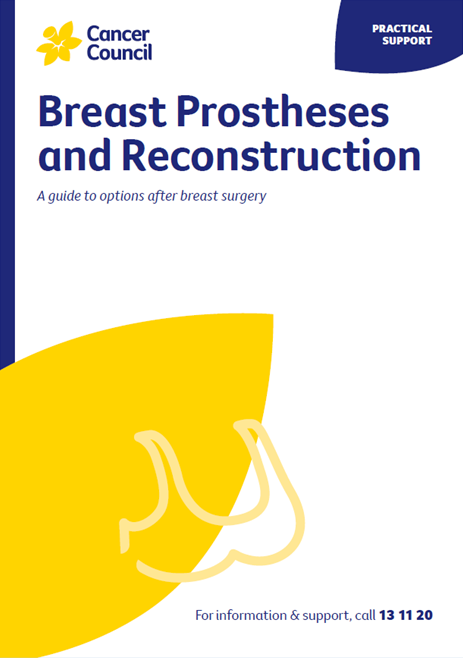- Home
- Cancer Information
- Managing side effects
- Breast prostheses and reconstruction
- Looking after yourself
- Body image
Body image after breast surgery
Any change to your appearance after breast cancer surgery may affect the way you think and feel about yourself, including your confidence and self-esteem. It is normal to experience sadness and grief after breast surgery. You may find that your sense of identity or femininity has been affected.
Learn more about:
- Getting used to the differences in your body
- Talking to health professionals
- How to manage changes in body image
Getting used to the differences in your body
It may take some time to get used to seeing and feeling the differences in your body. You may find that having a breast reconstruction or wearing a breast prosthesis improves your self-confidence. However, you may prefer to concentrate on accepting the changes in your body without wearing a prosthesis or having breast reconstruction.
Changing your clothing and using accessories might make you feel more confident when wearing a breast prosthesis. If you have a reconstruction, it will take time to adjust to the different way a reconstructed breast looks, feels and moves. The appearance of the breast will improve with time as scars heal and fade. It may take some time for you to adjust to the changes to your body image after reconstruction.
You may also be concerned about how others perceive the changes to your body, and this may affect your relationships and interest in sex.
Talking to health professionals
Talking to health professionals such as psychologists, counsellors or psychiatrists may be helpful. Don’t be embarrassed to ask for a referral. These health professionals may help you find strategies to help with your recovery. It may also help to talk to someone who has had a similar experience. Call Cancer Council 13 11 20 for information on support services.
How to manage changes in body image
- Wear clothes that make you feel good.
- Focus on yourself as a whole person (body, mind and personality) and not just the part of you that has changed.
- Draw attention to other parts of your body by using colours, clothing, make-up or accessories.
- Do activities that you enjoy or things that make you feel good about yourself, such as walking, listening to music, working or studying, having a massage, relaxing outside or volunteering.
- Consider having a decorative tattoo. This may make you feel more confident by acknowledging what you’ve been through or disguising a scar.
- Take part in a photo shoot.
- Register for a free Look Good Feel Better workshop, which offers tips and techniques to help restore appearance and self-esteem for people during or after cancer treatment. Call 1800 650 960.
→ READ MORE: Sexuality and intimacy after breast cancer surgery
Podcast: Sex and Cancer
Listen to more of our podcast for people affected by cancer
More resources
Dr Jane O’Brien, Specialist Oncoplastic Breast Cancer Surgeon, St Vincent’s Private Hospital, VIC; Clare Bradshaw, Clinical Nurse Consultant, Breast Assessment Unit, Fiona Stanley Hospital, WA; Rene Hahn, Consumer; Sinead Hanley, Consumer; Dr Marc Langbart, Specialist Plastic and Reconstructive Surgeon, Randwick Plastic Surgery, NSW; Melanie Law, Consumer; Sally Levy, Consumer; Annmaree Mitchell, Consumer; Ashleigh Mondolo, Breast Cancer Nurse Clinical Consultant, Mater Private Hospital Brisbane, QLD; Rochelle Osgood, Clinical Nurse Consultant – McGrath Breast Care Nurse, Sunshine Coast University Hospital, QLD: Dr Kallyani Ponniah, Head of Department, Breast Centre, Sir Charles Gairdner Hospital, WA; Meg Rynderman OAM, Consumer; Sarah Stewart, Breast Care Nurse, The Royal Women’s Hospital, VIC; Erin Tidball, 13 11 20 Consultant, Cancer Council NSW; Jane Turner, Senior Exercise Physiologist, Sydney Cancer Survivorship Centre, Concord Cancer Centre, NSW.
View the Cancer Council NSW editorial policy.
View all publications or call 13 11 20 for free printed copies.



